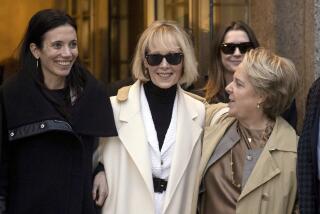Jury Deadlocks on Libel Award to Psychoanalyst
- Share via
SAN FRANCISCO — Jurors weighing psychoanalyst Jeffrey M. Masson’s libel case against the New Yorker said Wednesday they believe he was defamed by a 1983 profile in the magazine but are deadlocked on the question of how much money he should be awarded.
In an unexpected turn of events on the third day of deliberations, the eight federal court jurors here released a note revealing that although they unanimously agree Masson was libeled by writer Janet Malcolm’s article, they are split on his request for $7.5 million in damages.
U.S. District Judge Eugene F. Lynch asked the jurors to return this morning and get a “fresh start.” If they are unable to agree on a figure, a mistrial will be declared.
Malcolm, 58, rushed from the courtroom with her lawyer after the brief session and would not speak with reporters. Masson, 52, looked gleeful but would say only that he is “pleased with what’s happened thus far.”
Attorneys on both sides characterized the jurors’ announcement as uncommon and agreed that it is a troubling signal for the New Yorker and Malcolm, one of its star writers. Although Masson sued both the journalist and the magazine, it was unclear whether the jury has found both parties responsible for the defamation.
“At this point, we really don’t know much,” said Charles Kenady, an attorney for the New Yorker.
Charles O. Morgan Jr., Masson’s lawyer, agreed that many questions remain. But he said the jury’s action--while not a verdict--clearly shows “they have ruled in favor of my client.”
“I felt pretty confident we would win, and I think justice is prevailing,” Morgan said with a grin.
The jury’s announcement came after a three-week trial that captivated the nation’s intellectual elite and drew standing-room-only crowds.
At issue in the case is a two-part series Malcolm wrote for the New Yorker in 1983. The articles, which explored Masson’s iconoclastic views on psychoanalysis and were later published as a book, portrayed him as a narcissistic womanizer and an academic flake.
Shortly after the series was published Masson sued, claiming that the stories were a “total distortion” of his comments during interviews that spanned six months. Malcolm has insisted that she is a scrupulously careful writer and charged that Masson is merely in the painful throes of denial--wishing he had not said words he did in fact say.
Specifically, Masson accused Malcolm of fabricating four quotations and taking a fifth out of context in a manner that made it libelous.
Since Masson filed his lawsuit in 1984, it has been amended four times and dismissed twice. In 1991, it was reinstated by the U.S. Supreme Court in a landmark decision that set a new standard that Masson and other libel plaintiffs must meet.
To win, Masson must prove not only that at least one of the quotes was fabricated, but also that it significantly changed his meaning and damaged his reputation. Experts considered the last element the toughest for Masson, largely because his reputation already was stained by his controversial views.
After the jurors released their note Wednesday, Lynch asked how long they had been wrestling with the question of damages. Forewoman Jeanette Stark said the jurors had taken at least half a dozen votes on the issue since deliberations began May 28 but remain “far apart” in their views on what constitutes a suitable award.
When Lynch asked if there was still room for negotiation, the jurors said they would give it another try.
In federal court, unlike state court, juries must reach unanimous verdicts--both on the issue of liability and on the damages.
Lawyers involved in the case were divided on the legal result of a mistrial. But Martin Garbus, a prominent New York libel lawyer, said that if jurors “come back with only half of a decision, then the whole thing gets thrown out and you start from square one again.”
Garbus predicted that the jurors would agree on damages. “Juries inevitably compromise on money.”
More to Read
Sign up for our Book Club newsletter
Get the latest news, events and more from the Los Angeles Times Book Club, and help us get L.A. reading and talking.
You may occasionally receive promotional content from the Los Angeles Times.







